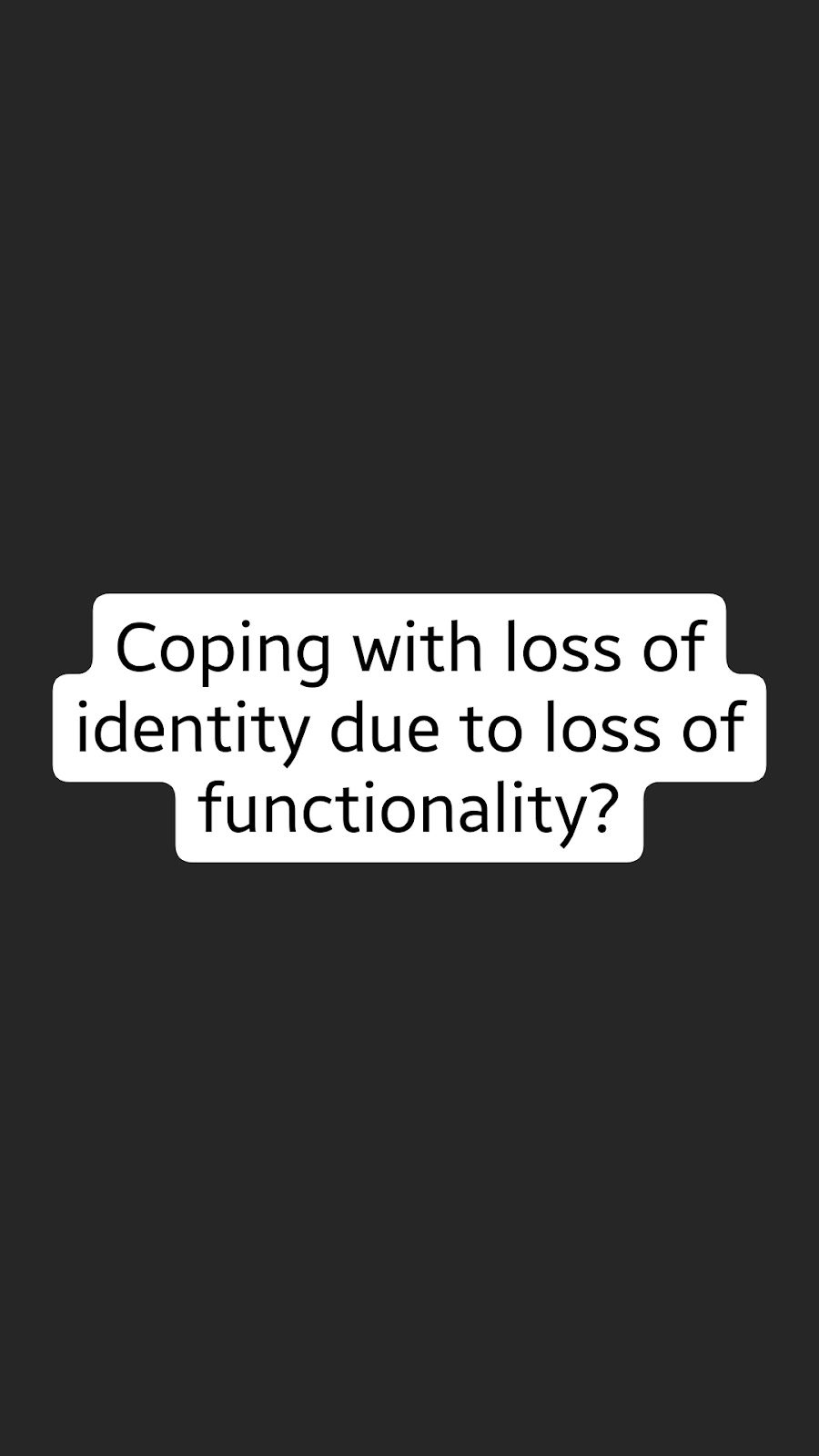It has been ingrained in us that much of our identity comes from what we do. What we do for work, what our hobbies are, what we do with the majority of our time.
So what happens illness strikes, when age strikes, and starts to strip away those parts of ourselves that we had attached to our sense of identity? How do we cope with those losses that come over and over again?
I think we need to reevaluate what identity means. We need to look at life differently in order to cope with these losses.
Identity shouldn't be about what we do, but by what we enjoy, about how we go about life, about our thoughts and actions, likes and dislikes, how we relate to others, how we see the world. It should be about what we are passionate about, what encourages us to wake up in the morning to fight our illnesses another day. What makes living worth it. That should be our identity. What and who we love. That should be the measure of success, of who we are.
If we can reframe our own definitions, then those devastating losses can be reframed in turn. If we can see our lives differently from the narrative that's been pounded into our instincts and views, it's easier to move on from losses to find new forms of identity.
This is me:
I am no longer a seasoned athlete.
I used to play a lot of different sports at competitive levels. That's not true anymore. I still love sports. I am still an athlete at heart. Just because I can't play competitively anymore does not change who I am, because athletics is something that excites me and gets me up in the mornings. I have had to shift my activity levels - to yoga, or kayaking, or short walks, or swimming. My identity is more of the life I enjoy rather than the exact sport I play.
I am a professional musician. I play piano and I sing. I no longer perform regularly, and I no longer perform competitively (at least not very often). That doesn't make me any less of a musician. I love music. I love learning new songs and practicing at home. I may not be able to perform as often as I used to, and all of my performances are now volunteer-based, but my identity is still as a musician.
My love for horror and dystopian films is part of my identity. My ability to fall in love at first sight with every single dog, cat, or horse that I see is part of my identity. My love for artistry is part of my identity. My love for playing games - card games, board games, video games, computer games - with loved ones is part of my identity. My rule-following, people-pleasing, love for learning, love for reading - all of these things are part of my identity. My hatred for making crafts is part of my identity. My love for cooking and baking, my pet peeves, my annoying habits, my desire to dress up whenever I leave the house, my love for heels, my love for camping , my distaste for certain foods - all of these things make up an identity. Not necessarily a job, or what I have to do to survive, but all the different loves and hates that make up an entire personality. I will always look for ways to nurture all of these parts of my identity - whether in an active or passive way.
Whenever a disease takes away one of these multiple facets of my personality, I try to find a way to shift with the direction my health is going. I try to come up with solutions.
As an example:
With being a musician, some medical truths have been difficult to accept. I have known for a few years shy of 20 years that I will go blind; my central vision will erode. It means that reading music will become more difficult - but doable. I will have to learn braille. I will have to memorize more. I will have to rely on my ear.
But this year, I have had some issues with my hearing. I don't know what will happen because I don't even know what the problem is yet - and I will likely have to wait for a year before I can see a specialist to get answers. It is *possible* that I may also go deaf. From what I've read, it is unlikely, but I have to admit the possibility, considering I already have some hearing loss.
So what happens, as a musician, if I go both blind and deaf.
The answer is: I guess I will have to rely on muscle memory, and other people to help me. I will have to go entirely by touch when playing the piano. I will have to rely on my years of experience knowing where certain pitches sit on my vocal cords.
I also know that it is possible. If I have to do it - I will do it. I will learn how to detect frequencies based on how the sound feels in my body. I will learn how different vibrations feel in my hands. There are many aspects I will not be able to do - but there are many that will be doable, even if the worst should happen.
That ^^
Right there.
That is how I cope.
I come up with a game plan. I shift my thinking. I find ways to look ahead, to see the possibility, and I focus on that as much as I possibly can.
